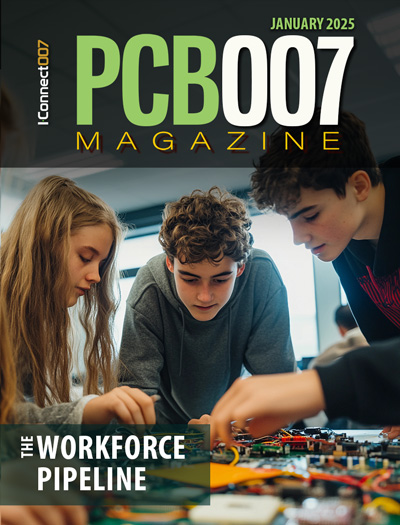-

- News
- Books
Featured Books
- pcb007 Magazine
Latest Issues
Current Issue
It's Show Time!
In this month’s issue of PCB007 Magazine we reimagine the possibilities featuring stories all about IPC APEX EXPO 2025—covering what to look forward to, and what you don’t want to miss.

Fueling the Workforce Pipeline
We take a hard look at fueling the workforce pipeline, specifically at the early introduction of manufacturing concepts and business to young people in this issue of PCB007 Magazine.

Inner Layer Precision & Yields
In this issue, we examine the critical nature of building precisions into your inner layers and assessing their pass/fail status as early as possible. Whether it’s using automation to cut down on handling issues, identifying defects earlier, or replacing an old line...
- Articles
- Columns
Search Console
- Links
- Media kit
||| MENU - pcb007 Magazine
Quantum Leaps: Winners of Airbus and BMW Group’s Quantum Computing Challenge Unveiled
December 12, 2024 | BUSINESS WIREEstimated reading time: 3 minutes
Airbus and BMW Group have pushed quantum computing forward another step to leverage its significant potential for future mobility solutions. At Q2B, the companies have unveiled the winners of the Quantum Computing Challenge, an international initiative to identify and mature quantum solutions for the most promising mobility applications.
Quantum computing has the potential to impact various industries by speeding up our responses to an array of computational challenges, from optimizing supply chains and manufacturing processes to improving vehicle and aircraft engineering. Quantum-inspired algorithms, already able to run today on classical high-performance computers, can be used to impact the design of the next generation of mobility solutions and give us a glimpse of the significant impact real quantum algorithms could have on future mobility solutions.
“The teams have achieved outstanding progress, and the results of this challenge confirm that quantum technologies have the potential to shape the next generation of aircraft,” said Isabell Gradert, Vice President Central Research and Technology at Airbus. “Quantum technology is no longer confined to only fundamental research. Even if it might still be a long way off, it’s clearly advancing towards industrial applications, and we must collaborate with the best experts in the world so that we can fully leverage its potential as soon as it becomes viable,” she added.
"Quantum technology has the power to redefine innovation across industries. This year’s Airbus and BMW Group Quantum Computing Challenge underscores the importance of cross-industry partnerships in accelerating the journey from groundbreaking research to practical applications," said Robert Bruckmeier, General Manager Computing & Network Artificial Intelligence at BMW Group. "While we are still in the early stages, the progress made in this challenge reaffirms our belief in quantum technology’s potential to drive extraordinary advancements for the automotive industry.”
The results of the challenge will enable both companies to identify the most promising quantum computing applications to improve the way aircraft and cars are designed, manufactured and operated. A winning team was selected for each of five competition categories:
1. Quantum Simulation – The team from the University of Southern California in the U.S. demonstrated that material behavior, such as energy absorption and binding properties, can be better understood by using quantum technologies.
2. Quantum Solvers – The team from the University of Hamburg in Germany showed how quantum computing could be combined with classical computing solutions to solve complex equations to minimize aircraft noise and maximize aerodynamic efficiency.
3. Quantum-powered Logistics – The team from 4colors Research, a start-up from the UK, used quantum computing to minimize CO2 emissions and other costs required in the supply chain logistics process, a particularly complex challenge for the mobility sector.
4. Quantum Machine Learning – The team from Quandela, a start-up from France, explored whether quantum computing can enhance critical scenario generation, such as transforming limited daytime data into precise and realistic nighttime conditions. The potential application for mobility would be to improve the reliability of autonomous systems in diverse environments.
5. And in the Golden app, open category – The team from TU Delft, a Netherlands University, provided a novel solution in quantum composite design. Their work stood out for its real-world applicability, specifically addressing optimization techniques in the layering of carbon fiber materials. The weight-saving properties of carbon fiber are particularly important in reducing fuel consumption in the aviation and automotive industries.
All finalists in this competition were given access to quantum resources through Amazon Web Services (AWS) to run their algorithms, as well as an opportunity to work with aerospace, automotive and quantum experts from Airbus and the BMW Group.
Launched in December 2023 and hosted by The Quantum Insider, the Quantum Computing Challenge aims to inspire the global quantum computing community to take solutions out of the lab and put them into practice in the field of transportation. A jury composed of world-leading quantum computing experts – from academia to industry – teamed up with Airbus and the BMW Group to select five winners from more than 100 submissions. Each of the five winners was awarded a prize of €30,000.
Suggested Items
IonQ Announces Innovations in Compact, Room-Temperature Quantum Computing through XHV Technology
02/21/2025 | BUSINESS WIREIonQ, a leader in the quantum computing and networking industries, announced the completion of its next-generation ion trap vacuum package prototype intended to realize smaller, more compact, room temperature quantum systems.
Infineon and the BSI Pave the Way for Quantum-Resilient Future
01/27/2025 | InfineonInfineon Technologies AG has achieved a milestone on the way to a quantum-resilient world in collaboration with the German Federal Office for Information Security (BSI). I
Fein-Lines: CES 2025—The Consumer Technology Association's Super Event
01/07/2025 | Dan Feinberg -- Column: Fein-LinesThe Consumer Electronics Show, better known simply as CES 2025, starts today, Jan. 7, and continues to Jan. 10 in Las Vegas with an expected attendance of 150,000 tech enthusiasts and innovators. This highly anticipated annual show is a preview of the amazing technology advancements and devices we can expect to see over the next few years.
Imec, Partners Unveil SWIR Sensor with Lead-free Quantum Dot Photodiodes
12/31/2024 | ImecAt the 2024 IEEE International Electron Devices Meeting (IEDM), imec, a world-leading research and innovation hub in nanoelectronics and digital technologies, and its partners in the Belgian project Q-COMIRSE, present a first of its kind prototype shortwave infrared image sensor with indium arsenide quantum dot photodiodes.
Infleqtion Secures $11 Million DoD APFIT Award to Accelerate Deployment of Quantum Timing for Defense Applications
12/04/2024 | BUSINESS WIREInfleqtion, the world’s leading quantum information company, today announced its receipt of $11 million in funding from the U.S. Department of Defense (DoD) as part of the latest tranche of awards under the Accelerate the Procurement and Fielding of Innovative Technologies (APFIT) program.


